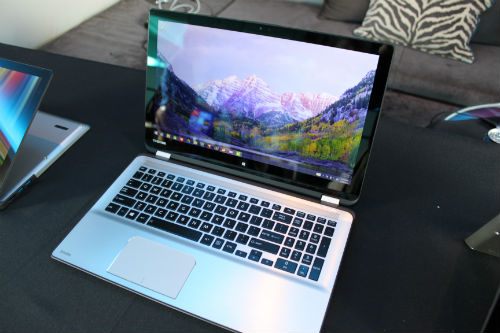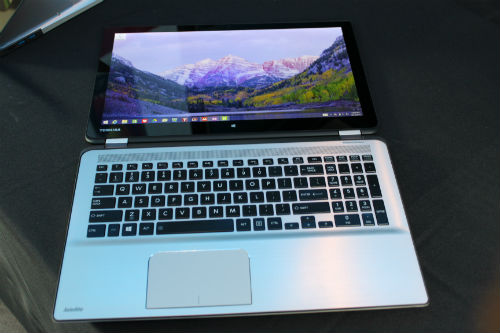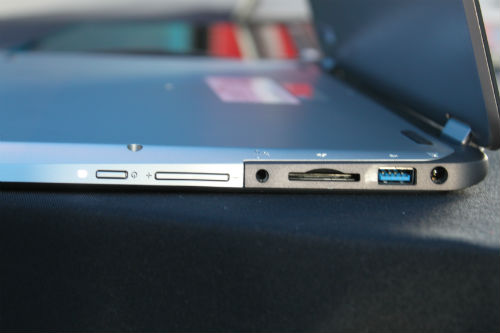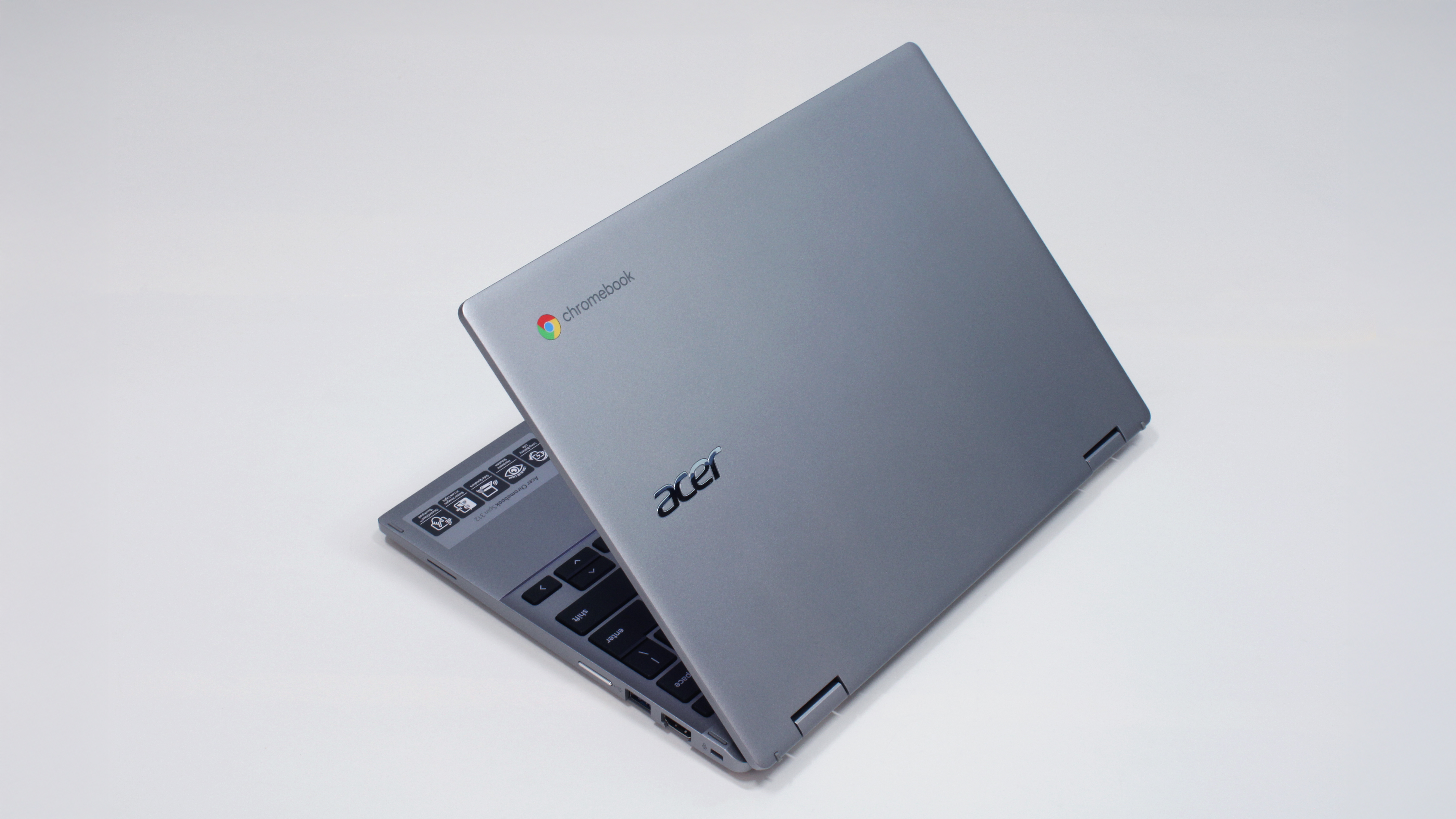Toshiba Satellite Radius Folds Into 5 Different Modes
What's 0.75-inches thick, weighs 4.85 pounds and can bend over backwards? If you answered the Toshiba Satellite Radius, you're right on the money. Toshiba is furthering its push into the convertible PC market with the Satellite Radius, a 15.6-inch laptop that can be folded into numerous modes. Starting at $925, this flexible workhorse will be available for heavy multimedia users beginning in early July.
We've seen this sort of flexible design successfully executed by the Lenovo with its Yoga line of laptops. However, Toshiba is hoping to upstage the competition by offering all that shape-shifting versatility in a larger form factor. But is bigger better in this case?
Design
The Radius is sheathed in a glittering chassis made of silver brushed aluminum, making it an absolutely lovely laptop to behold. The bottom corners of the notebook are rounded, giving the notebook a subtle U shape that's characteristic of the updated Skyline design.
We like the notebook's clean, modern look, especially the frameless keyboard design that embeds the full-sized keyboard in aluminum rather than glossy plastic. The sides of the notebook are lined with a thin strip of black soft-touch plastic to protect against damage when switching modes.

MORE: Toshiba Best and Worst Notebook Brands Rating
Weighing 4.85 pounds and measuring 0.75 inches thick, the Radius is slightly thicker and heavier than the 15-inch MacBook Pro with Retina Display (4.5 pounds, 14.1 x 9.7 x 0.71 inches) and the Dell Precision M3800 (4.6 pounds, 14.65 x 10 x 0.71~0.31 inches), the world's thinnest workstation. However, this machine didn't feel heavy in our hands or on our laps.
Multimodes
Similar to the Yoga line, the Radius' versatility is made possible by its hinges. Painted light grey and black, the Radius' metal hinges employ a two-axis design that allows the display to be positioned at just about any angle. The Satellite Radius boasts five modes compared to the Yoga's four. There's the traditional Laptop mode as well as Tabletop mode, which lays the notebook flat for two-person collaboration.
Stay in the know with Laptop Mag
Get our in-depth reviews, helpful tips, great deals, and the biggest news stories delivered to your inbox.

Presentation mode places the device at a 270-330 degree angle, creating a tent shape, making it easy to share your screen while presenting. Taking Presentation mode one step further is Audience mode, which flips the keyboard underneath, leaving the screen exposed for watching movies. Tablet mode folds the display back onto the laptop's undercarriage. Toshiba has a trick up its sleeve here, placing a pair of magnets along the lip of the device to keep the panel firmly in place.
Transitioning between modes was an exercise in seamless precision. We were impressed at how steady the display remained while in Audience mode, despite the more extreme angles.
We have only two gripes. The first is the positioning of keys in Tablet and Presentation mode. It's great that the keys automatically disable once each mode is initiated, but we wished they would retract into the keyboard dock similar to the Lenovo ThinkPad Yoga. Toshiba should also add some software similar to Lenovo's Yoga Picks that suggests specific programs to use in each mode.
Display and Audio
The Radius has a 15.6-inch, 1920 x 1080p display. Viewing angles are nice and wide, preventing color inversion at just about every angle. Colors on the screen were rich, particularly the royal blue on the Start Screen. However, we're anxious to see how the panel holds up when we view high-res videos and images.
Befitting its premium status, the Radius is outfitted with a pair of Harman/Kardon speakers augmented by DTS' audio processing software. We discovered the speakers were capable of delivering loud, clear audio in Toshiba's large, airy showroom.
Keyboard
Toshiba has added its slightly curved, backlit TruType keyboard to the Radius. We gave the keyboard a light test during our demo and found that the keys felt comfortable and had a nice amount of bounce.

Specs
The $925 base configuration of the Radius features an Intel Core i5 processor with 8GB of RAM and a 750GB hard drive. The $1,048 model bumps the CPU up to Core i7 and expands the storage to 1TB. Both versions will have three USB 3.0 ports, HDMI, an SD Card reader, a combination headphone/mic jack and a power jack.

Outlook
Toshiba could have a winner on its hands with the Satellite Radius. The 15.6-inch laptop offers head-turning looks, powerful specs and a 1080p display in a lightweight chassis that's both portable and flexible. We're impressed that Toshiba has added an additional mode in its attempt to outflex Lenovo's Yogo. However, the Radius' success hinges (pun intended) on the software suite that Toshiba preloads onto the device. As it stands, the Radius seems like a powerful productivity/multimedia machine, but it will need more to step out of Lenovo's shadow.

Sherri L. Smith has been cranking out product reviews for Laptopmag.com since 2011. In that time, she's reviewed more than her share of laptops, tablets, smartphones and everything in between. The resident gamer and audio junkie, Sherri was previously a managing editor for Black Web 2.0 and contributed to BET.Com and Popgadget.
